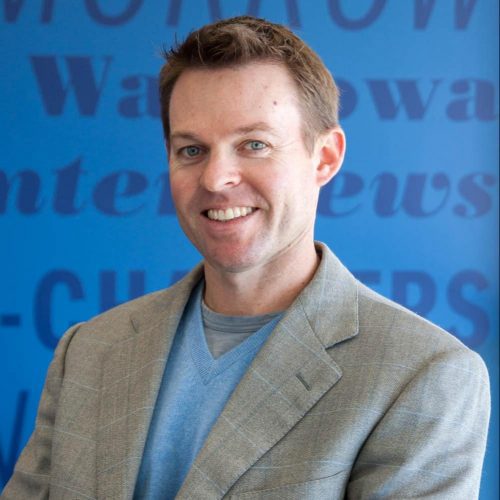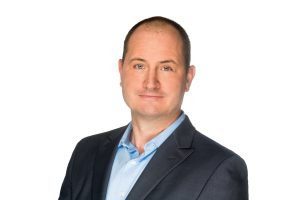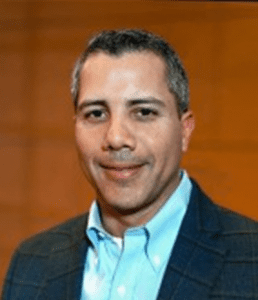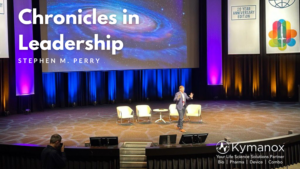
5 Questions with Paul Nolde, Fund Manager/Managing Director, Riverflow Growth Fund
“5 Questions With…” is a weekly BioBuzz series where we reach out to interesting people in the BioHealth Capital Region to share a little about themselves, their work, and maybe something completely unrelated. This edition features 5 Questions with Paul Nolde, Fund Manager/Managing Director, Riverflow Growth Fund.
Paul Nolde has close to two decades of experience in the banking, finance, and venture capital sectors, serving in multiple business development and management roles. As the Fund Manager and Managing Director of Riverflow Growth Fund, a seed-stage venture capital fund based in Richmond, VA, Paul is responsible for all aspects of fund management and investment-related processes. This includes business development, deal flow cultivation and due diligence, syndicate investor cultivation, investor relations, and portfolio management (including board service).
Before this he served as a director at NRV, an early-stage venture capital firm also based in Richmond, VA. In this role, he co-led their overall business development strategies and their discernment process around new investment opportunities and supported several portfolio companies via board service. Before NRV, Paul was the Small Business Capital Strategist for Virginia Community Capital, where he was responsible for building the firm’s venture debt portfolio focusing on growth companies, social enterprises, and healthy foods and architecting their overall small business lending platform.
Before VCC, he was managing director of a family office in Richmond, VA, preceded by sales and strategy positions at Wells Fargo, Union First Market Bank, Bank of America, and Wachovia.
He is an active participant in, and advocate for, Virginia’s entrepreneurial ecosystem, serving on the boards of several local and regional organizations, including the Activation Council, CAV Angels, The Launch Place Seed Fund, and SCORE. Additionally, Paul sits on various boards at Virginia Commonwealth University and the University of Virginia, where he also serves as an adjunct professor of impact investing in its Batten School of Leadership and Public Policy.
He graduated from UVA in 2001 with a B.A. in Foreign Affairs, complimented by post-grad business studies through the McIntire School of Commerce Business Institute.
1. Please introduce yourself to our audience with a look back at your education and early career.
I never set out to have a career in venture capital…in fact, when I graduated college, being an entrepreneur and working in the “innovation economy” wasn’t really a “thing”. It didn’t have the same attraction as a profession that it does now. I’ve always loved diplomacy and world affairs, so I majored in Foreign Affairs at UVA, with the aspiration of going into the CIA or Foreign Service. However, my father had a successful career in finance, so when I found myself in Atlanta post-graduation, I figured, “why not?” and drove to Athens for a University of Georgia finance-oriented career fair. They wouldn’t let me in because I was not a student, so I had to buy a UGA t-shirt at the bookstore and sneak in the back.
Ultimately, I got a retail banking job at then First Union National Bank (now Wells Fargo after many mergers). Ever since my first job as a “financial specialist” in the branches, I’ve loved dealing with people and blending the financial realities of a problem or situation with the “what if” propositions of the future.
2. You are currently working on the Riverflow Growth Fund. Please explain the different roles you cover and why specifically this is focused on the healthcare industry.
Riverflow was conceived and architected by several professional peers of mine and leaders in the entrepreneurial ecosystem in Central Virginia. Seed funding in the tri-state area is a gap in the capital stack, and Riverflow was designed to, in part, fill that gap. Around the same time, VCU, VCU Health, and Activation Capital (an organization that supports innovation and entrepreneurs around Virginia) founded the Health Innovation Consortium in an effort to commercialize health innovation outside of the four walls of the hospital and school. At scale, the HIC aims to include other health systems and industry partners. As part of this effort, VCU Health became an anchor LP of Riverflow (by way of Activation Capital), hence focusing on the healthcare industry. However, Riverflow is a general fund and will focus on additional, non-health industries once the fund is closed..
As noted in my bio, as the sole Fund Manager/Managing Director, I am responsible for all aspects of fund management and investment-related processes. This includes business development, deal flow cultivation and due diligence, syndicate investor cultivation, investor relations, and portfolio management (including board service). Riverflow does have a board that ultimately governs the fund and a majority of the board doubles as the fund’s investment committee. I sit on the board and chair the investment committee.
3. What is something about Richmond’s healthcare space that most people in the BioHealth Capital Region probably don’t know about?
Richmond is fast becoming a, if not the national epicenter for advanced pharmaceutical manufacturing (e.g., Phlow Corporation, Civica, etc.). As we have witnessed with COVID, our reliance on foreign supply chains and legacy processing methods have greatly hindered this nation’s ability to rapidly develop and deploy life-saving medicines and vaccines. While Riverflow does not focus on pure pharma or therapeutics, we do invest in novel solutions on these sectors’ fringes, so I am very excited at the innovations that will crop up alongside this native industry cluster.
4. How do you see the VC world around this space growing over the next few years? What are the most likely challenges?
I am bullish on both health as an opportunistic sector to invest in and VC as a viable funding path over the next few years. Perhaps it’s because it’s my job, and I have to have some conviction and optimism measure! But practically speaking, I don’t think anyone can argue with the fact that health innovation, and more importantly, adoption, has been accelerated by at least a decade given the exacerbating pressures put on the system by COVID.
As Riverflow is presently focused on B2B provider-patient solutions, I see telehealth, remote patient monitoring, and outpatient/at-home care solutions, especially for investors. I’m also seeing many compelling pharmatech platforms seeking to democratize what has historically been a very opaque value chain.
As far as challenges go, and in part due to this accelerated adoption and transformation in the healthcare sector, from an investor perspective, I think high valuations and more competitive deal flow – historically a Silicon Valley effect – will continue to manifest themselves in non-SV markets. It can indeed be argued that the former is always a concern and sometimes cyclical, but I have not seen COVID dampen valuations as initially anticipated. With the latter, competition is good, but “coopetition” is better (again, from an investor standpoint).
Given the healthcare centers of excellence across the DMV region, I think native funders and their syndicates are in a unique position to uncover hidden gems that will not only continue to attract West Coast follow-on money (read: more established “blue chip” funds like Andreesen Horowitz, Sequoia, and Lightspeed Ventures), but the success of those companies can solidify the DMV as the next Boston or Nashville vis a vis a world-class healthcare ecosystem.
5. If You Could Learn Any One Skill In The World Without Trying (Like in the Matrix), Which Would You Pick and why?
This one is easy for me – coding. I’m naturally more right-brained than left, although my curiosity into how things work (and why) is, in part, the reason I’m lucky to do what I do for a living. That said when your business is diligencing and investing in platforms and applications that are shaping our future, having this fundamental skill set would be a very nice thing to have in my bag of tools. I’m not seeking to build the next Google or genetics analytical algorithm….I just want to understand the “how” more intimately so that I can offer additional strategic guidance to my portfolio companies.
Thank you to Paul Nolde for participating in the ‘5 Questions with BioBuzz’ series and stay tuned for more interviews with others from across the BioHealth Capital Region and beyond.



